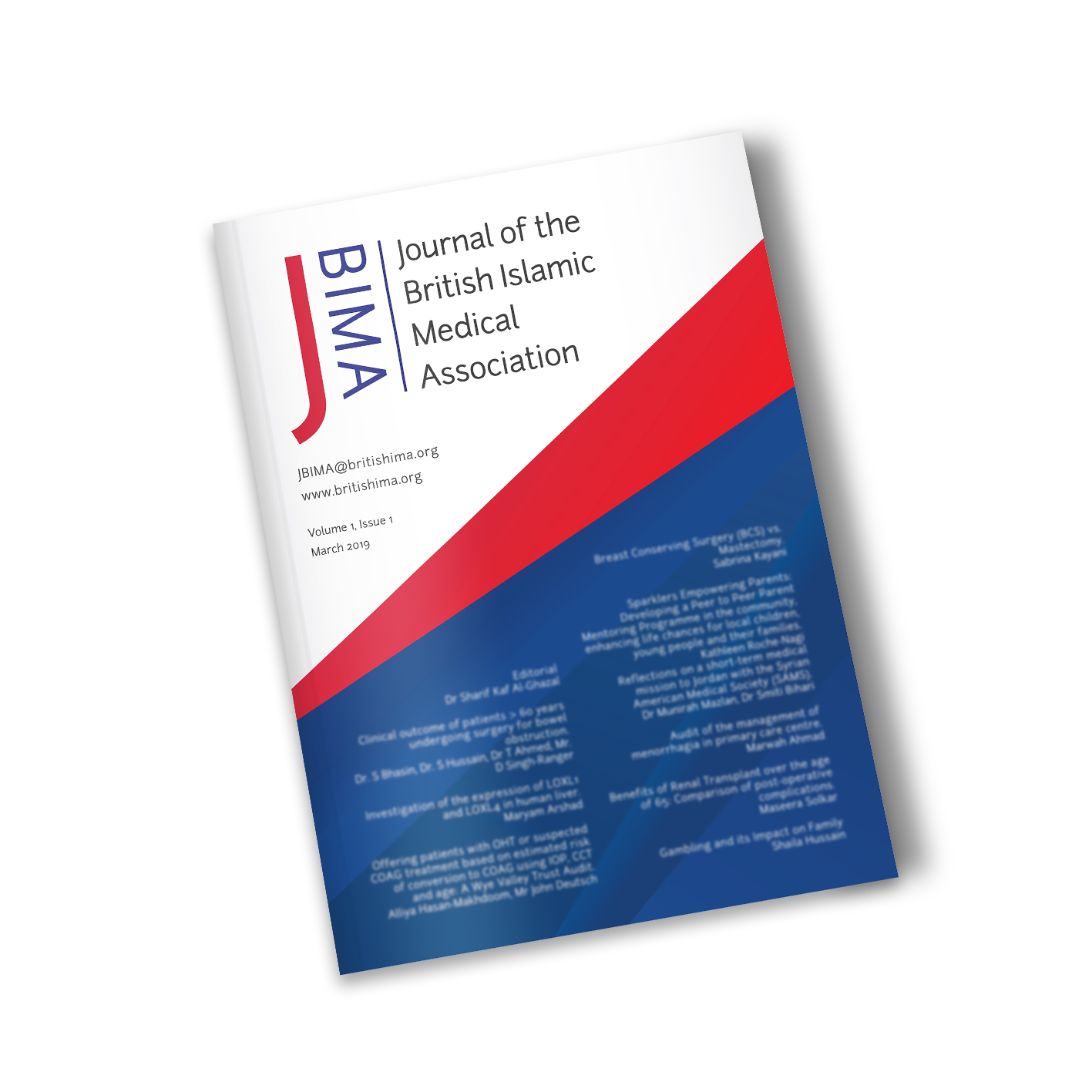
Assalamo Alaikom
The last 6 months have been unprecedented in modern history; Covid-19 has changed the world in real time and many things we previously took for granted we currently cannot do. As healthcare professionals, our practices have been affected and we have faced myriad challenges which we continue to deal with. We at the British Islamic Medical Association (BIMA) have been working hard with other Muslim and non-Muslim organisations to mitigate the effects of the pandemic. We are proud of what we have achieved with our members, and whilst an in-depth explanation is beyond the scope of this editorial, more can be found on them by clicking this link here.
One of the challenges we have faced is that of the increased death rate amongst the Muslim and BAME (Black Asian Minority Ethnic) communities during the pandemic, sadly including healthcare professionals. As the UK slowly flattens the curve, hopes rise that the government has a better grasp on the Covid-19 pandemic. The death toll and life changing impact of the pandemic on this segment of society has been a horrific ordeal. This is deeply worrying and highlights the importance of ensuring that urgent action is taken to protect members of the BAME community. As Covid-19 is still no clearer to being eliminated, the question must be asked: How can the Muslim and BAME community be protected? And what are the lessons that must be learned?
The evidence so far indicates that BAME doctors are affected worse by the lack of Protective Personal Equipment (PPE). This is no coincidence, BAME medical professionals can be reluctant to speak out when provided with inadequate PPE and fear being cast as troublemakers by their superiors. The metaphor of a soldier going out to the frontlines with no protection has been oft quoted during the pandemic, and it is a simple comparison to understand. Doctors who are seeing patients and do not have adequate PPE are quite literally risking their lives; those who protect society, must be protected themselves.
Moreover, it has been reported that BAME medical professionals have had inadequate Covid-19 risk assessments making them feel more vulnerable as a consequence.
Furthermore, there are likely to be complex socio-economic, occupational, health and structural inequalities and cultural factors explaining the disproportionate impact of COVID-19 on the BAME population. It is imperative that other organisations join forces to put pressure on the NHS and its senior executives to protect its BAME staff members and eliminate structural racism.
We have lobbied the government to launch a formal inquiry by adequately qualified professionals to explore the factors mentioned above and to make practical recommendations to the government that can be taken on board. In the long term, government intervention is needed to dissect more complex socio-economic factors that put the BAME community at greater risk, and more can be done at a community level.
BIMA was successful in taking on a leading role to form a BAME medical umbrella group (including almost 40 other medical organisations). BIMA will work hard as part of this umbrella group to go beyond the issues of the Covid-19 pandemic and explore the structural inequalities faced by the BAME community within the NHS. Inequality is so rooted within the NHS, that even Dr Rashid Abbasi (whose terminally ill daughter was in the hospital) was subject to gross mistreatment in the hospital at his daughter’s bedside. The story that was released recently was shocking and horrifying.
Lobbying the government is a huge undertaking, but this advocacy is needed. And with the renewed focus on the Black Lives Matter movement, it is imperative that BIMA makes progress on this issue.
Finally, Ramadan has come and gone. Eid Al Fitr, and Eid Al Adha have both come and gone too. But somehow, we feel that we haven’t experienced either. Even Friday jum’aa prayers at the mosque have only been restarted very recently and restrictions on numbers still exist. And whilst some have said that Muslims have been to blame for surges in cases in different parts of the UK, it must be said that the Muslim community has displayed remarkable discipline during the pandemic. The announcement of a local partial lockdown with less than 24 hour notice on the eve of Eid Al Adha was a difficult pill to swallow, but the Muslim community abided by it. As Muslims, we have not been able to go on Hajj this year and have sacrificed for the sake of our community. Allah (SWT) is testing us; this virus which can barely survive outside a human host has proven to be so deadly and has taught even the strongest of nations, with nuclear weapons, humility. We are still learning about Covid-19; we do not yet have a vaccine or a cure but we must remain patient and optimistic. This pandemic will pass InshaAllah and as Muslims, it is imperative upon us to be part of the effort to find a cure. After all, as the prophet Mohammad (PBUH) once said, “there is no disease that Allah has created, except that He also has created its treatment”.
With all good wishes
Wassalam.
Dr Sharif Kaf Al-Ghazal
JBIMA, Editor in Chief

